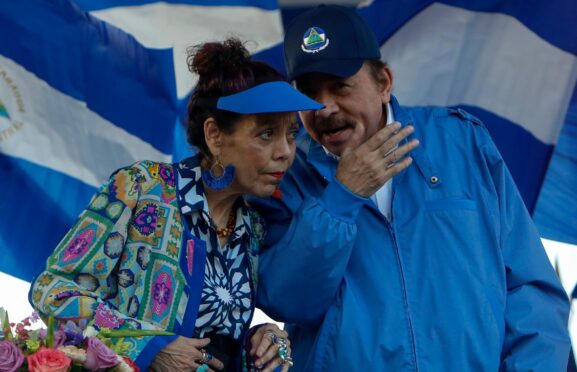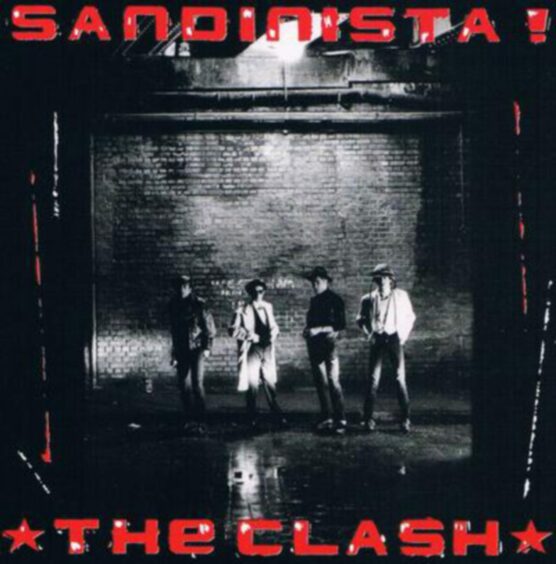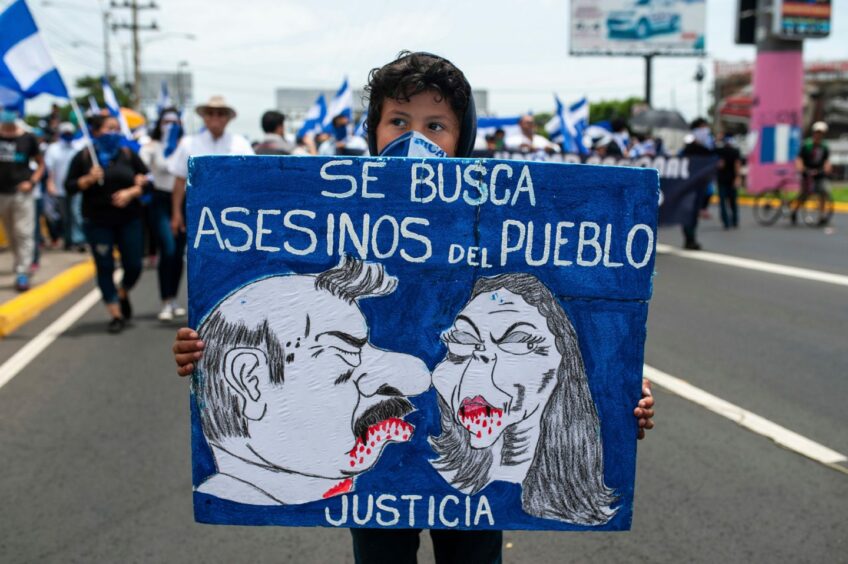
On the streets of Managua, anger is simmering over a looming election that many fear has already been stolen.
With two weeks until Nicaragua’s presidential and parliamentary elections on November 7, there have been no political rallies and the vote has scarcely merited a mention, even in the state-controlled media.
President Daniel Ortega and his wife, vice-president Rosario Murillo, have not been seen in public for weeks, except to give carefully choreographed appearances at midday most days on television.
The main opposition parties have been banned from standing or their leaders thrown into jail for what critics claim are trumped-up charges of treason, so many are asking: who will vote in this one-horse race?
Going to the polls
Observers suggest that in this tiny Central American state of 6.6 million inhabitants the real turn-out for the ruling Sandinista Liberation Front will be low, possibly around 30%, according to polls.
Nevertheless, Ortega’s supporters are expected to vote many times to boost their standing at the polls and with no international observers permitted to check what is happening, the real result may never be known.
Forty-two years after the overthrow of the brutal dictatorship of Anastasio Somoza inspired punk band The Clash to celebrate the revolution in their hit album Sandinista, the Ortega administration is now internationally vilified for its crackdown on the opposition and a critical media.
The elections will be a test of whether any vestige remains of the democratic dream which the Sandinistas symbolised around the world.
Ortega, 75, is seeking his fourth consecutive term as president. Murillo, 70, is again his running mate. They will face five small right-wing parties which have been allowed to stand by the electoral body but which are dubbed “collaborators” by opposition groups.
“It is one of the worst dictatorships in the world,” was the blunt verdict of the EU’s foreign policy chief Josep Borrell at a meeting of the bloc’s foreign ministers on Monday.
“In Nicaragua, the repression and the authoritarian drift is more than a worry, it is unacceptable.”
Borrell, the EU’s High Representative, said that Ortega and Murillo had “eliminated the political opposition” by jailing rivals, thus “ensuring their victory at the polls”.
Ned Price, a US State Department spokesman, was no less damning, when he said last week at a press conference that the elections had “lost all credibility” because of Ortega’s arrests of critics and seven opposition politicians.
‘I have to take precautions when I am reporting’
In May, the Nicaraguan president began arresting public figures who dared disagree with him.
The families of 155 political prisoners said in a statement that their loved ones had been subjected to “mistreatment and torture” in prison.
Wilih Navarez is one of the few journalists who still remains in Nicaragua who does not work for state media. Scores of others have been forced to flee abroad after suffering legal threats or police intimidation.
The 37-year-old, who works for Canal 10, one of two independent television channels, says the official explanation for the absence of any election campaign is Covid-19 restrictions.
However, he says some doubt whether this is the real reason and suspect the government fears demonstrations against the regime.
“It may well be that they are worried people may demonstrate against Daniel (Ortega) and all the problems we have,” said Navarez from his Managua home. Police stoned his house one night and he has faced repeated threats from the security forces and what he calls “fanatical” supporters of Ortega.
“I am scared. I have to take precautions when I am reporting. Some of the fanatics who support the government can make up things and report me to the police. It would be too risky to cover rallies,” he said.
Narvarez said the pressures of working as a journalist in Nicaragua have weighed on his personal life. “My wife assumed the risks of marrying a journalist in a country like this. But now I worry for her and my son. I don’t want anything to happen to her or to my family,” he added.
The Sunday Post attempted to contact the Nicaraguan government, but none of our requests were answered.
The opposition
Daisy George West, whose British ancestors ruled the Caribbean coast of Nicaragua until the 19th Century, represents the Civil Alliance for Justice and Democracy, a civic opposition organisation.
Like about 140,000 other Nicaraguans, she has gone into exile. She left in July and is living in neighbouring Costa Rica while others are now starting new lives in the US, or Spain.
“Of course this election will be a farce. The seven leaders of the real opposition parties are in prison or have been exiled. So it makes no sense for anyone to vote,” she said.
“There is no right of law, no protests are allowed and there is 24-hour police monitoring.”
Opposition leaders Christiana Chamorro, Félix Maradiaga, Juan Sebastian Chamorro, Arturo Cruz, Noel Vidaurre, Miguel Mora and Medardo Mairena are languishing in jail or living abroad.
A cyber crime law passed in 2020 imposes jail terms of up to 10 years for any citizens convicted of promoting “fake news” which contravenes state security. It has been dubbed Putin’s Law.
The crackdowns started in 2018 when there were widespread protests over rises in taxes and cuts in benefits. Ortega cancelled the reforms but banned political protest. Ortega claims the anti-government protests were an attempted coup led with foreign backing.
At least 325 people died during clashes in 2018 between government forces and protesters, according to the Inter-American Commission on Human Rights.
Julio Lopez, a journalist for Onda Local, a radio station which is not aligned with the state, fled to Costa Rica in June because he said it had become impossible to do his job in his own country.
“I don’t think many people are going to take part in the elections. The Sandinistas will find ways to make it look like they have a bigger share of the vote by voting repeatedly. In reality, polls have shown they only command about 30% of the vote,” said Lopez.
“People have become resigned to the fact there is no opposition to Ortega. They are disappointed. We have been betrayed.”

Enjoy the convenience of having The Sunday Post delivered as a digital ePaper straight to your smartphone, tablet or computer.
Subscribe for only £5.49 a month and enjoy all the benefits of the printed paper as a digital replica.
Subscribe © SYSTEM
© SYSTEM © Cristobal Venegas/AP/Shutterstoc
© Cristobal Venegas/AP/Shutterstoc